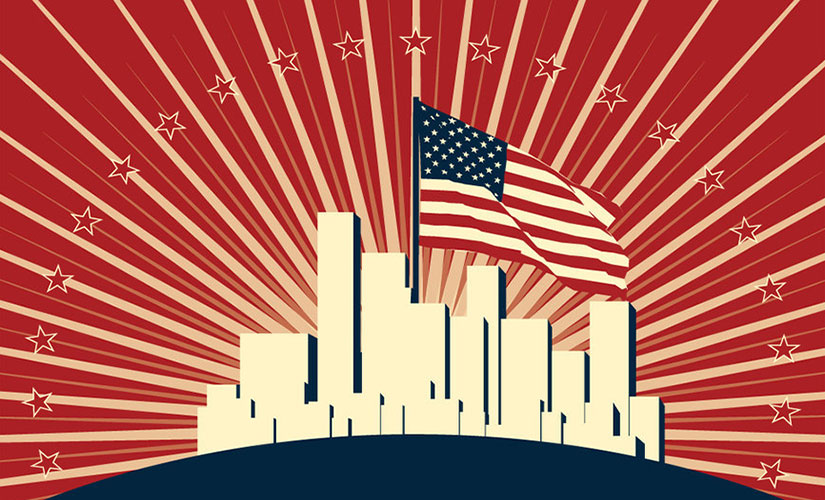In the book, A History of the American People, by Paul Johnson, the author opens with, “The creation of the United States of America is the greatest of all human adventures. No other national story holds such tremendous lessons, for the American people themselves and the rest of mankind.”
Most Americans see Johnson’s words as an example of the concept of “American exceptionalism.” Until relatively recently, Americans often viewed their world in biblical terms. Our new nation was considered the “new Jerusalem,” the “light of the world,” and “a shining city upon a hill.” We were the embodiment of man’s greatest hope for a fallen creation. Through hard work, self-sacrifice, and rugged independence, Americans sought to overcome both the natural world and humanity’s sinful nature.
This mindset evolved during the nation’s early history was composed of two parts. On the one hand, it was full of hope and optimism, believing that individuals could achieve great success in a country if the government did not restrict opportunity. On the other hand, Americans saw the world beyond the nation’s borders as riddled with disharmony and war.
So when the founding fathers spoke of “civil religion,” natural abundance, and manifest destiny, they were giving birth to what has been called the grand American narrative, which has been sustained for more than two centuries. Individual liberty, personal responsibility, respect for private property, and the desire to “avoid unbeneficial alliances,” the primary characteristics of the grand American narrative, have long served as the glue that holds together a nation of diverse economic, social, and religious interests. Today, this narrative has all but collapsed.
A new identity of entitlement, dependence, and collective responsibility is replacing the grand American narrative. This new narrative, known as the victim narrative, is—unlike like its predecessor—attempting to import from a corrupt world, rather than eschew it. The grand American narrative and the victim narrative represent opposing worldviews that cannot coexist in the same space simultaneously.
At its core, the victim narrative rejects the very notion that every American and every nation is responsible for its success or failure. The belief in rugged individualism and self-reliance, at the individual and national levels, has given way to a focus on real or perceived grievances at home and abroad. The “isms,” capitalism, classism, racism, sexism, are to blame for the failings of individual Americans and the nation itself. Personal choices are conspicuously absent from any explanation of success and failure. The victim narrative promises to correct past wrongs and free Americans from the so-called chains that bind them.
This seductive story does not discriminate based on age, gender, race, or religion. It seeks to influence every American. In rejecting Benjamin Franklin’s warning, “They who can give up essential liberty to obtain a little temporary safety deserve neither liberty nor safety,” the victim narrative offers security in the bosom of the government but at the cost of our individual liberties.
The victim narrative is not new. Plato warned of its appeal in The Republic, and the Framers of the Constitution sought to create an “Empire of Liberty,” preventing the ascension of the victim narrative by creating a limited republic—not a democracy.
The checks and balances found in the Constitution were specifically designed to restrain the power of the national government’s three branches in domestic and international affairs. The balance of power needed to check the federal government was lost in 1913 with the passage of the 17th amendment, removing states’ representation in Washington.
The Constitution’s original limitations, the amendment process, and the separate powers of the states were thought to be sufficient to protect the people from the rise of Plato’s democratically elected despot, like what de Tocqueville called “soft despotism.”
In 2020, the hard, severe turn from American exceptionalism and the grand American narrative toward cancel culture, Marxism is as high a threat to our nation as any war America has ever fought. Championed by extremist Democrat politicians, the erosion of American values will continue to deteriorate.
Consider the mind-bending trail of death and destruction in Marxist and communist regimes past and present. Most have now thankfully been banished to the ash heap of history following the implosion of the Soviet Union and liberation of the enslaved nations of Eastern Europe. Only China, North Korea, Vietnam, Laos, and Cuba remain as Marxist-Leninist/Communist states.
An accurate estimate of the death toll under communism is impossible, but a reliable number from experts is over 100,000,000. Over one hundred million. The emblems of dehumanization are sickening to revisit: indoctrination of youth, falsification of history, forced labor, gulags, starvation wages, empty shelves, endemic poverty, secret police everywhere, no dissent permitted, no exit possible. This is the unvarnished truth of a century of Marxist tyranny.
But to deny that left-wing extremists aren’t a massive part of the problem is to ignore the overwhelming evidence that shows they are using this opportunity to promote their agenda, a tactic Marxists have been using for more than a century.
So here we are at this crossroads. In three months, we have an election. Every few years, this grand experiment, called the United States, allows us to change our direction and correct mistakes. In 2020 it’s the most important election since 1960.
Make or break time for the good ole USA. Marxists are running amuck in our cities, placated by gutless politicians from both parties. Political opportunists are attacking the very founding of our great nations, rewriting our history and toppling monuments to our greatest heroes. DON’T SIT THIS ONE OUT!!

